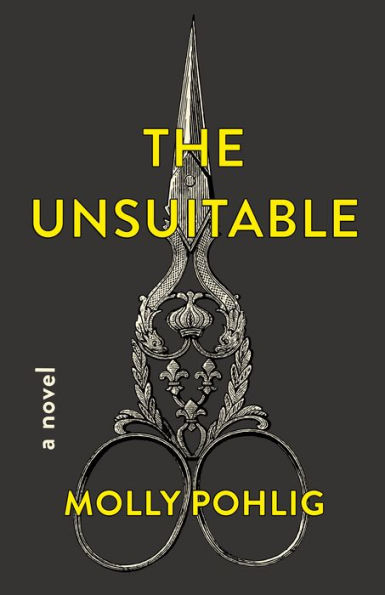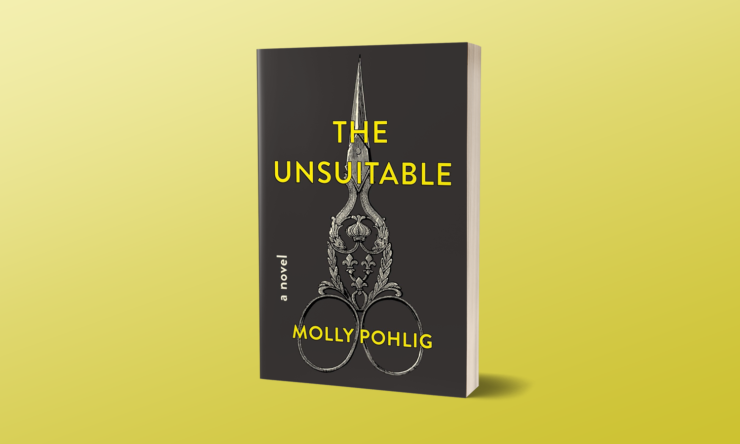If the repulsive can strive to be resplendent, then Molly Pohlig’s debut novel, The Unsuitable, a gothic horror story full of shudder-inducing grotesqueness, achieves such a paradox—perhaps a little too well.
Set in Victorian England, The Unsuitable centers around 28-year-old pseudo-spinster Iseult Wince, and the ghostly presence of her mother, Beatrice. Iseult has spent her life both battling and embracing Beatrice’s presence in the deep scar on her neck, remnants of a wound Iseult believes was created when she was ineptly yanked from her mother’s birth canal by an inexperienced midwife, causing Iseult’s collarbone to protrude and leading Beatrice to bleed to death. Iseult is forced to wear mourning garb since her childhood, and is paraded through a series of potential suitors in Mr. Wince’s attempt to rid himself of the daughter he neither likes or nor wants.
[CONTENT WARNING: Body Horror, Self-harm]
Iseult carries on numerous conversations with Beatrice, both internally and out loud, which coupled with her less-than-appealing physical appearance (via the Victorian definition of beauty, one assumes), gives her an unmarriageable reputation. Though overly doted upon by her housekeeper, Mrs. Pennington, Iseult is emotionally detached at her best and full of a mutinous, violent rage at her worst. Meanwhile, Beatrice natters on with a borderline-like litany of criticisms, cooings, cajolings, and attempts to utterly control Iseult’s life. As a child, she attempts to overeat the voice out, and then when that doesn’t work, she strives to starve Beatrice away. Nothing sticks until, when Iseult is eighteen, she accidentally stumbles upon a way to finally quiet Beatrice.
The method, first discovered when Iseult accidentally stabs herself in the neck with a pair of embroidery scissors, leads her to ever more horrifyingly elaborate acts of self-mutilation. These episodes temporarily send Beatrice away—where, Iseult does not know. Pohlig’s descriptions of each new mutilation is cringingly vivid, each description of Iseult’s inner and outer appearance ever more gleefully repulsive. One instance when Iseult shoves five hatpins into her foot at the dress shop before a dinner with potential suitors, afterward in her room, she “pressed a finger into the wound, squelching out more of the slow blackish liquid, so it looked like escaping slugs or leeches.”
Buy the Book


The Unsuitable
One can actually feel Pohlig’s description of Iseult’s having to have a toe amputated when she was a baby (her inattentive wet nurse didn’t notice she had a strand of hair wrapped tightly around her little toe, a particular nightmare of mine with my own infant) slither through my bones.
It’s with one of these descriptions later, however, that needlessly hurts the story. It is the type of thing that seems so innocuous in fiction written by white women but is actually an expression of internalized bias that can come out in a text in a myriad of ways. In an attempt to illustrate part of Iseult’s grotesqueness and her father’s cruelty, Pohlig describes how Iseult is always tries to hide her sharpish teeth, which displease Mr. Wince to see, so much so that he takes her to an exhibit on “primitive cultures,” which features people from Africa:
“There had been a portrait of a group of pygmies, which in itself would have startling enough for a ten-year-old British girl, and their broad grins revealed mouths full of sharpened teeth like miniature daggers.”
A number of things are disturbing about this passage. First, Pohlig purposely pulls the reader out of their state of suspended belief with “a ten-year-old British girl,” as it is unlikely this is how Iseult would have considered herself in her memories. Second, no Black people appear in the book in any other context except this one. While that may be believable within the confines of a white-centric lens of Victorian England, the next passage makes the issue even worse:
“Iseult was convinced that her father had brought her to show her this particular likeness even though he didn’t mention it again afterward. But she was every after conscious not to smile widely, lest people suppose she had been raised in the Congo.”
Pohlig made the mistake of turning Black people into something grotesque, with no other context before or after, other than Iseult’s wish to not be mistaken as unsavory as a pygmie from Africa. This could be a vehicle used to play off Iseult’s last suitor, Jacob Vinke, whom Mr. Wince arranges a marriage with against her, and Beatrice’s, wishes. Jacob has a skin condition whose only medicinal relief causes his skin to be silver, another freakshow oddity to pair with Iseult’s supposed monstrous qualities. It does not, however, mitigate the damage done in casting Black Africans as monstrous, which was startling, clumsy, and wholly unnecessary.
Jacob, however, was actually very interesting as a character and it was through him that Iseult seems to come alive and into herself, so the sudden end of the wedding and his own small arc were disappointing, as well as Iseult’s ultimate action, which to explain would ruin the ending.
When it is all said and done, The Unsuitable is an intensely psychological novel, very based in the horrors of the body, and delving into grief, suicide, eating disorders, post-partum depression, personality disorders, co-dependent relationships, all terms unknown in 19th century England, and in some ways, excellent horror tropes. Unfortunately, Pohlig adds little depth to any of the underlying issues and instead wallows in the outer toxicities that remain untreated until the very worst happens.
Very much a first book with these failings, I still look forward to seeing Pohlig’s maturation in future work.
The Unsuitable is available from Henry Holt.
Angela Maria Spring is the owner of Duende District, a mobile boutique bookstore by and for people of color, where all are welcome. She holds an M.F.A. in poetry from Sarah Lawrence College, was a 2018 Kirkus Fiction Prize judge, and has work forthcoming in Radar Poetry, Pilgrimage, Borderlands: Texas Poetry Review, and Third Wednesday. You can find her on Twitter at @BurquenaBoricua or at duendedistrict.com.










